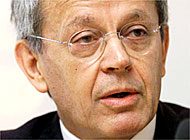Experts draw conclusions as science festival ends

Switzerland's first national science festival draws to a close this weekend with organisers delighted by the enthusiasm of the public but anxious to learn from the lessons of the experiment.
Attendance figures at the hundreds of events which took place in and around Switzerland’s 10 university cities were much higher than expected. More than 100,000 people visited the displays at Zurich’s main station alone.
“We had more than 1,000 events – that’s probably too many,” said festival organiser, Daniel de Roulet. “In the future, some events could probably be held at other times of the year so the festival itself can be concentrated into four days. But it will have to remain decentralised in the different language regions. That’s the only way such a festival can work in Switzerland.”
Discussions with the managing committees, which organised regional events, are to follow over the weeks and months ahead.
“Everything to do with art and culture was tremendously popular and caused a lot of interest,” said de Roulet. “Where events were only educational and merely attempted to popularise science, it was not so good so I’m sure that art and culture will play an important role next time too.”
One thing which really caught the public’s interest were the happiness barometers, set up in the train stations of Switzerland’s main cities. Some 66 per cent of visitors told the barometers they were happy – a marked contrast to previous scientific studies where the figure was more than 90 per cent.
Charles Kleiber, secretary of state for science and research, said other questions also needed to be answered. “We really have to know who attended the events and whether we caught the people we wanted to catch. Young people, for example, did they attend?”
His comments followed a recent opinion poll which showed that a third of young people in Switzerland thought science did more harm than good.
De Roulet said one unexpected finding was that many scientists actually discovered for the first time what their colleagues in other departments were up to. It suggested that future festivals could be more trans-university and trans-disciplinary.
One of the aims of the festival was to promote dialogue between the scientific community and the general public. It arose partly out of the emotional debates which took place in the late 1990s over a referendum to restrict genetic engineering.
Kleiber said the ghosts of that controversy had not been laid to rest. “These are real questions about the way we perceive nature, the way our society can master the development of science.
“In Switzerland, we are very focused on the idea of the consensus and having that kind of debate is perhaps more important for the building of a consensus than sweeping dust under the carpet.”
by Vincent Landon

In compliance with the JTI standards
More: SWI swissinfo.ch certified by the Journalism Trust Initiative
You can find an overview of ongoing debates with our journalists here. Please join us!
If you want to start a conversation about a topic raised in this article or want to report factual errors, email us at english@swissinfo.ch.